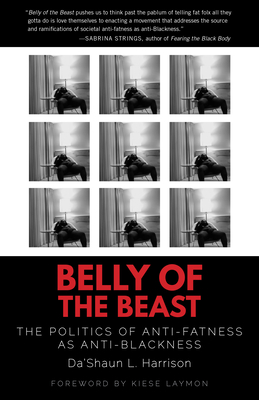More on this book
Community
Kindle Notes & Highlights
Read between
February 16 - February 18, 2024
What is the utility of “body positivity” if it only seeks to provide one with a false sense of confidence rather than to liberate all from that which cages the body?
The issue with all of these comments is that, at their core, they suggest that self-love is enough to eradicate anti-fatness and that if you just accept yourself, or love who you are, that somehow the methodical violence of anti-fatness—housing, employment, etcetera—is no more. This is what is violent about “body positivity”; it is benevolent anti-fatness in that it is masqueraded as some sort of semblance of acceptance for fat people when it is, instead, an opportunity for Thinness to reroute, but not give up, its hold on fat people’s collective liberation.
Self-love, even a radical one, cannot and will not disrupt or bring an end to systemic violence.
The idea is that if boys are to be boys that will one day be men, they’d have to accept their part in patriarchy.
Take, for example, Samuel A. Cartwright. In 1851, Cartwright named two “illnesses” that were exclusively found in Africans. The first of the two was what he called “drapetomania,” which was a mental illness that caused the Slave to run away. The second one was called “dysaesthesia aethiopica,” which was a sort of weakness or lack of work ethic that Africans would develop if they were not enslaved or otherwise in the possession of white enslavers. His suggested treatment for both illnesses was to wash their open wounds, drape their bodies in oil, beat them with a leather strap, and force them
...more
We are not taught to exercise for the sake of enjoyment, nor are we taught to enjoy our bodies in motion. We are taught, per contra, that we exercise so that we can be healthy, and that health must look opposite of fat. This means that health is punishment.
She was murdered by a culture designed to punish fat people at the behest of “health” itself.
Children are sent to these boot camp–like weight loss programs to be shamed for their weight, manipulated into believing that the abuse they’re forced to endure is about being accepted instead of being punished for owning a body that looks different from what the rest of the world sees as normal. Fat kids are being penalized for their bodies, “whipped into shape,” disciplined for something the rest of the world views as an offense and a breach of an imagined moral code.
Forcing exercise and diets, especially onto children, is an attempt to punish them for their fatness and that is abuse.
Dieting, or yo-yo dieting as it’s more accurately referred to, is but a temporary food plan with only temporary solutions to something that is not inherently a problem.
On diet culture, Virgie Tovar once wrote: Diet culture does one thing very successfully: it alienates us from our natural relationship to food and movement, things that we as human beings have had a relationship to since the beginning of time, and which we cannot live without, and it sells them back to us as “diet” and “exercise” with the promise that with hard work and self-denial we can achieve a state worthy of love, respect, and admiration.
the celebration of “lost” weight is much more of a celebration of thievery. It is the theft of a fat person’s ability to see themselves as someone who matters, theft of a person’s right to see their body as neutral rather than inherently bad, a breach of consent on how a person enters into a relationship with their fat body.
At twelve years old, Rice stood at five feet, seven inches and weighed two hundred pounds. He was indeed larger than the average twelve-year-old—a fact that only matters if one believes police have a right to murder Black people, or that police should exist at all.
But that makes trans people no less tangible. We can be physically touched, seen, and heard, and still so much about how we navigate through and experience life is so underresearched, undervalued, and dismissed.
As such, abolitionists don’t ask, “How do we deal with abusers?” and instead ask, “How can we better the conditions of the communities most often impacted by police, prisons, and other forms of state violence so that they have the resources to not need or desire to commit this harm?”


